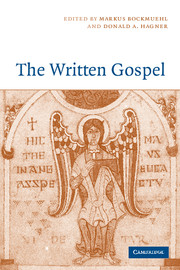Book contents
- Frontmatter
- Contents
- List of contributors
- List of abbreviations
- Introduction
- PART I BEFORE WRITING
- 1 ‘Gospel’ in Herodian Judaea
- 2 The gospel of Jesus
- 3 Q1 as oral tradition
- 4 Eye-witness memory and the writing of the Gospels
- PART II WRITING THE FOUR GOSPELS
- PART III AFTER WRITING
- Appendix: Graham Stanton's publications
- Bibliography
- Index of ancient sources
- Index of authors
1 - ‘Gospel’ in Herodian Judaea
Published online by Cambridge University Press: 07 December 2009
- Frontmatter
- Contents
- List of contributors
- List of abbreviations
- Introduction
- PART I BEFORE WRITING
- 1 ‘Gospel’ in Herodian Judaea
- 2 The gospel of Jesus
- 3 Q1 as oral tradition
- 4 Eye-witness memory and the writing of the Gospels
- PART II WRITING THE FOUR GOSPELS
- PART III AFTER WRITING
- Appendix: Graham Stanton's publications
- Bibliography
- Index of ancient sources
- Index of authors
Summary
A link between the Jews of ancient Judaea and the Christian use of euangelizein or euangelizesthai, ‘to announce’, with the cognate noun euangelion, has regularly been postulated through comparison of the New Testament with the Old. These Greek words in their New Testament contexts have been perceived, through the LXX and the Vulgate, as sharing a good part of the semantic range of the Hebrew verb lebasser, ‘to announce’, and its cognate noun besorah, in the Old Testament. A signpost in the general direction of this view is formed by Heb 4.2 (cf. 4.6), ‘we have been evangelized (euēngelismenoi) just as they’ – the generation of the exodus – ‘had been’.
The Epistle to the Hebrews here implicitly classifies as evangel the message of election, victory, and settlement to come which was conveyed through Moses, for example from the divine messenger (in Greek, angelos) at Exod 3.2–14, but was disregarded by the people and their princes other than Caleb, as shown above all in Num 13–14; cf. Ps 95.11. Of special note for scholarly assessment of the New Testament euangelizesthai, however, were a series of verses in the psalms and prophets which use the verb lebasser and its participle mebasser, rendered in the LXX by euangelizesthai and euangelizomenos, respectively, to speak expressly of the announcement and announcers of good tidings (Pss. 40.10; 68.12; Isa 40.9; 41.27; 52.7 (parallel with Nah 2.1 (1.15)); 61.1).
- Type
- Chapter
- Information
- The Written Gospel , pp. 7 - 30Publisher: Cambridge University PressPrint publication year: 2005
- 5
- Cited by



